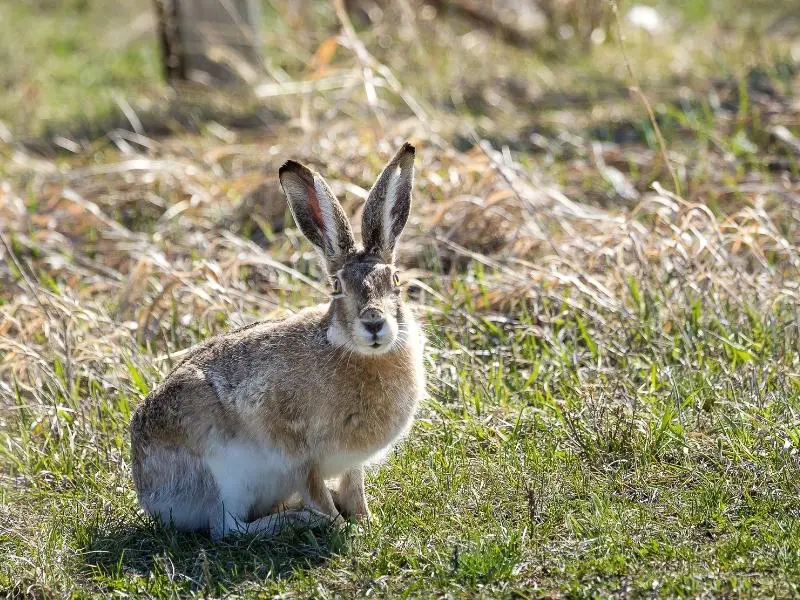With the name “jackrabbit,” you may think the animal is a rabbit, and therefore, you can eat it because people eat cottontail rabbits and domestic rabbits bred for meat production. But jackrabbits aren’t rabbits at all; they are actually hares.
So can you eat a jackrabbit?
You can eat jackrabbits that you’ve hunted and killed. And properly preparing the meat can make a tasty meal. However, beware of parasites and bacterial diseases like tularemia that can be passed on to humans, often with fatal results if not treated early on.
Let’s look at whether or not it is safe to eat a jackrabbit, what it tastes like, the risks of eating rabbit meat, and more.
Is a Jackrabbit Safe to Eat?
A jackrabbit may be safe to eat, but it may also not be safe.
If the jackrabbit is infected with tularemia and a human consumes the infected meat, the person can become sick because tularemia can be passed onto people.
Tularemia, also called rabbit fever or Francisella tularensis, is a disease that occurs naturally. It’s carried by wild rabbits and hares, as well as deer flies, ticks, and other insects that feed on these mammals.
A person can become infected when they eat a contaminated rabbit or hare, have been bitten by an infected rabbit or hare, or through exposure while skinning. Tularemia is found in both the blood and meat of an infected animal. You can even become infected by simply inhaling airborne bacteria.
If someone has been infected with tularemia, symptoms like aches, chills, and fever show up 2-10 days after exposure. If not treated immediately, it can be fatal.
The hare or rabbit’s liver and spleen will show whether the animal has tularemia. Look for lesions on the liver and spleen; these organs may be swollen and you’ll see the telltale tularemia white spots.
If you see signs of tularemia, dispose of the animal and thoroughly clean your hands.
When handling wild rabbits and hares, hunters should wear protective gloves when skinning and/or field-dressing the animal and when preparing the meat for cooking (even with no signs of tularemia because there might be other bacteria you should be protected from).
The rabbit or hare meat also needs to be cooked thoroughly to at least 165°F to ensure any harmful bacteria is killed.
Does Jackrabbit Taste Good?
When compared to rabbit meat, hare meat looks like red meat because it is dark. Hare meat is also gamier, tougher, and strongly flavored (especially if the jackrabbit has been feeding on sage bushes).
There are people who adore the taste of jackrabbit and those who despise it.
From the experts:
- Don’t treat jackrabbit or hare meat the same as you would red meat protein.
- If you don’t treat jackrabbit meat right, it’ll end up tasting like your leather boots.
- It’s recommended to cook jack meat long and slow for the best results.
- Opt for young jackrabbit meat.
When Can You Eat a Jackrabbit?
Most people believe it is a myth to wait until the first frost before hunting rabbits and hare. However, there is a good reason for this “myth.”
If you wait until the first frost, then there’s a lower chance that the wild rabbits and hares you are hunting have been infected with rabbit fever.
But if you don’t wait, then it’s more likely that the hare or rabbit you hunted is infected with tularemia because ticks and other disease-bearing insects thrive during the hotter months of summer.
Risks of Eating (Too Much) Rabbit Meat

There are a few risks that come with eating rabbit meat:
Risk 1: Rabbit Starvation
Protein poisoning is one of the biggest risks when consuming rabbit or hare meat.
Rabbit starvation (aka protein poisoning) occurs when your diet includes a protein source that is very rich in protein but low in fat. Rabbit meat is an example of such a protein source because it’s low in fat and higher in protein content than other meats.
If you don’t consume enough fat (even from other sources), then protein poisoning happens because your body can’t process all the protein without fat.
If you survive on rabbit or hare meat alone for a few days, you’ll be fine. Your body has plenty of fat stores it can utilize to help you break down the protein content.
However, after a few weeks of eating rabbit meat and not enough fat, your body will have a tough time digesting the meat.
Diarrhea will set in, which makes things complicated as your body is now also getting rid of important vitamins and minerals.
Risk 2: Tularemia Disease
Tularemia disease is another risk when you eat rabbit or hare meat. When infected insects bite a wild rabbit or hare, they pass on Francisella tularensis, which is a bacteria.
When hunting wild hares like jackrabbits and rabbits, you may not even know that the animal has been infected with Tularemia. An infected hare or rabbit may appear lethargic or uncoordinated, but they may also appear to be fine.
It is only when you field dress or skin the hare or rabbit that you can look at its spleen or liver for the white or yellow spots that indicate the animal has tularemia.
If you aren’t careful, the infectious disease can easily be passed onto you. If treated early with antibiotics, you’ll most likely be fine. But if not treated, it is fatal.
Risk 3: Parasites
Hares and wild rabbits are likely to have a lot of flukes, intestinal worms, warbles, and other parasites.
The parasites can be killed if you properly cook the hare or rabbit meat to an internal temperature of 160-165°F. However, there are some hunters who’d discard the meat if they see signs of warbles – raised bumps on the rabbit or hare meat, which can be cut off with a knife.
Is It Legal to Eat Rabbit and Hare Meat?
It is legal to eat rabbit and hare meat when you’ve hunted the animal yourself. In the United States, it is illegal to sell wild rabbit or hare meat that hasn’t been inspected by the government.
Ensure that hunting is legal in your state.
For example, some states regard rabbits and hares as game animals and you need a permit to hunt these, while in other states, jackrabbits are not game animals and can be hunted without a permit.
Black-tailed jackrabbits are usually permitted to be hunted, while white-tailed jackrabbits may not be.
My Last Hare Meaty Thoughts
You can eat wild rabbit and wild hare meat like that of the jackrabbit. But it’s important to check your state laws about whether you can hunt these animals.
Also, stay safe when handling jackrabbit meat as the animal may be infected with tularemia – wear protective gear, and don’t consume the meat if you see white spots on the liver and/or spleen.
Related Articles:

